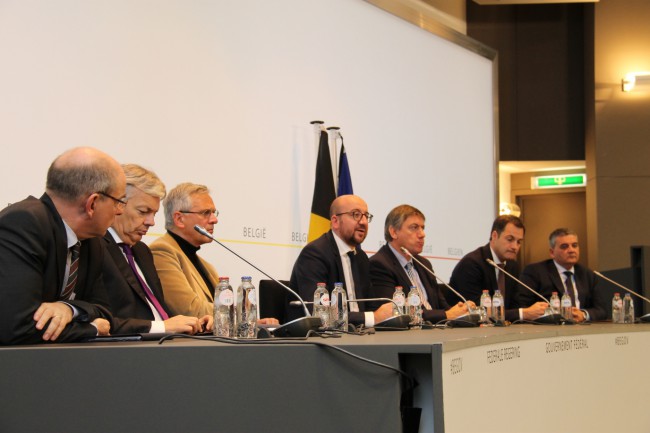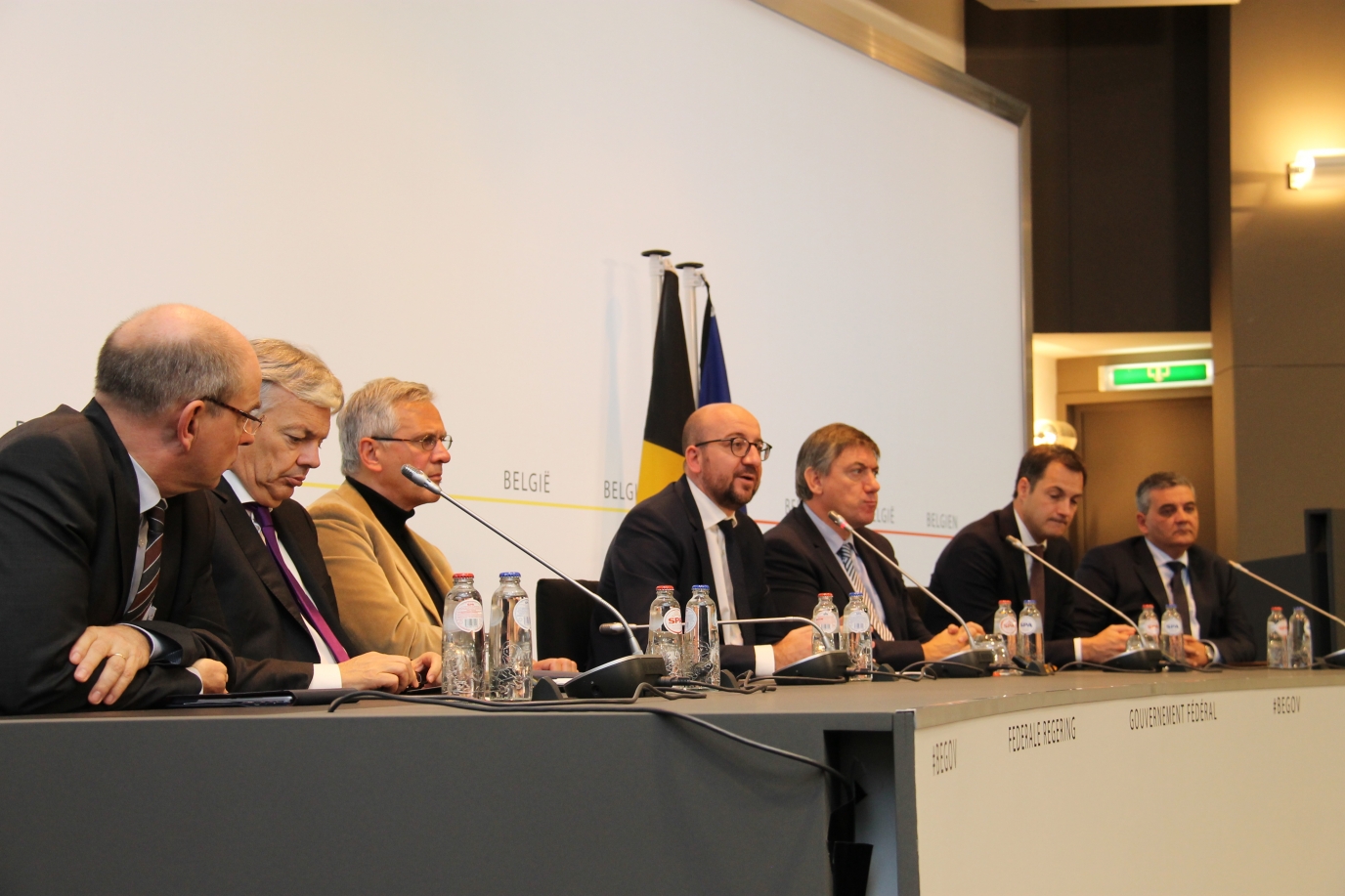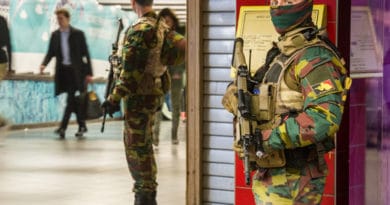Brussels lockdown crisis management: total and surreal improvisation (v2)
 (B2) The Belgian government's crisis management after the attacks in Paris seems totally surreal when viewed with a bit of hindsight. Very strong measures arriving at a state of emergency reached in no capital in Europe, even those affected more directly and more seriously by attacks than Belgium... without any explanation... The total shutdown of the Belgian and European capital is not really a proof of seriousness in crisis management. The way this alert was lifted looks like a real stampede and casts doubt on the relevance of the measures taken...
(B2) The Belgian government's crisis management after the attacks in Paris seems totally surreal when viewed with a bit of hindsight. Very strong measures arriving at a state of emergency reached in no capital in Europe, even those affected more directly and more seriously by attacks than Belgium... without any explanation... The total shutdown of the Belgian and European capital is not really a proof of seriousness in crisis management. The way this alert was lifted looks like a real stampede and casts doubt on the relevance of the measures taken...
First step: avoid falling into fear
The first message delivered by the Prime Minister just after the attacks in Paris on Friday, November 13 is however clear: “We ask fellow citizens to avoid going to Paris if it is not essential. Controls will be tightened in public events. I appeal to not fall into the trap of fear. All democrats must stand up against terrorism. »
Second step: stopping
Then everything accelerates. Decisions follow one another at a formidable pace during the night from Friday to Saturday: triggering of the level 4 alert, closure of establishments open to the public (cinema, theatre, etc.), the metro (and certain bus lines and tramway), then shops one by one on Saturday, maintenance of all these measures on Sunday, and finally, closure of all schools in the 19 Belgian municipalities over two days on Monday and Tuesday. Without really any public explanation other than to announce: there is an "imminent" threat. The soldiers, coming from elite units of the Belgian army, more accustomed to outdoor terrain than to patrolling the city, disembark from their trucks, helmeted, armed, in the capital and position themselves in all points of Brussels but not all. Dingo armored vehicles are even deployed at strategic locations (stations, European institutions, certain embassies, etc.). Read : And Brussels became black... Police operations are carried out at full speed. With nuanced results.
Exceptions... ubiquitous
The trains continued to circulate but not the subways. The airport, located on the edge of the Brussels region, a stone's throw from NATO, continued to operate as if nothing had happened. The shops in the center were closed. But those in the neighborhood remained open without ever being empty. The surrounding towns in the Walloon and Flemish regions, such as Mechelen (Mechelen), Halles, Waterloo remained unaffected by the measures. A totally grotesque situation...
Step three: back to normal
Le descending is just as brutal. The return to level 3 is announced suddenly on Thursday (November 26) in the afternoon. He even takes the Crisis Center by surprise, which always announced a few moments ago the maintenance of the measures until November 30 like the Brussels and federal politicians, who will then have great difficulty in justifying the maintenance of the measures.
A brutal measure totally unusual in Europe
Many States have experienced such a high level of threat. Madrid in 2004, London in 2005, Paris in 2015. Nothing similar has been planned. Even during the January events in Paris, in January 2015, when some terrorists were still running, no such lockdown was carried out. Ditto for the most recent attacks by the Bataclan and the Stade de Saint Denis. Passed the stupor and bewilderment, life resumed its course, taking a few precautions. Some theaters halted their performance for the first few days. But it was rather that the heart was not there. Schools and shops have not been closed, except for a particular reason. The subways, buses... continued to circulate.
An anxiety measure
Blocking a capital in this way is relatively tricky. The threat was strong, even very strong. Certainly. But it's not the first time. Is it enough to block everything? Taking a precautionary measure at some point - on Saturday - could be understandable. If only for reasons of economy of force. By extending this state of emergency beyond 24 hours, the government made a mistake. He has unnecessarily created an anxiety-provoking climate in the population, suggesting that he is not in control of the situation. He didn't really plan an exit solution, improvising new measures every day.
A patent lack of explanation
What is notable in Belgium is the absence of a political, important, detailed explanation. In France, in a much more serious and exceptional situation, the President of the Republic, François Hollande quickly intervened on the radio and television waves with a first message, quite clear. Then Parliament was solemnly summoned. And a new message publicly delivered to the Nation. A text explanation of the threat - quite limited but understandable - has been issued. None of this in Belgium. The message delivered at the end of a meeting of the Prime Minister, Charles Michel (Liberal), at the end of the meetings of a National Security Council, was delivered almost on the fly, and remained very succinct. We spoke of an identical threat in Paris without further details. There was indeed an intervention before the Chamber on November 19 (read here). But again no information on the reality of the threat. Just a big list of actions taken. A speech more intended to show that the government is reacting rather than to explain these measures.
No solemn public message
No elaborate statement, message to the nation, to the Belgian people, and even to parliamentary representation, has been developed. The King – who is all the same officially the Head of State and whose role this could have been – did not intervene either. At least to deliver a reassuring message. The only concrete information was provided by the Minister of Foreign Affairs, Didier Reynders, on the American channel CNN ! This way of managing the crisis, given the importance of the measures taken, reveals a patent error in crisis management. We felt that the government was afraid of being caught out in the event of an attack. He preferred to act in the same way as in medicine, the patient is plunged into a coma while the necessary operations are carried out.
A plunge into a coma, for lack of means
The real reason for this state of emergency is that there are not enough staff (*). The Minister of the Interior, Jan Jambon (N-VA) can well bend his chest by designating a culprit — "There is a nest of terrorists in Molenbeek", you have to clean Molenbeek", this martial language hides another reality badly. For years, there has been a growing disinvestment in both the police and the armed forces (Read: The Belgian army in need of bulletproof vests draws on the stocks of Uncle Sam). It is not, contrary to what is sometimes written (in France and by certain European newspapers), the administrative millefeuille of Brussels which is in question. The police and security system was greatly simplified after the Dutroux affair and the Octopus agreements. What is especially lacking is an obvious lack of staff. There is currently a shortage of 600 police officers within the framework of the Brussels workforce. And, in the most sensitive municipalities, more than 125 are missing, as reported on the RTBF, the police chief of the West Zone (which Molenbeek is part of), Commissioner Johan De Becker. The alert had been given. Last June, the mayor of Saint-Gilles, Charles Picqué, considered that the security situation in Brussels is “no longer tenable” if the numbers of the federal police continue to be reduced.
Comment: A certain cowardice
I received during this period a Lebanese colleague, totally surprised by the way life in Brussels was frozen. When I say astonishment, I should rather say incomprehension with a nuance of commiseration. " If we did this in Beirut every time... (**). Seen from the outside, in fact, this shutdown looks more like fear, even cowardice, in the face of the threat than a measure of good management. The fear of assuming political responsibilities in the event of an attack and of being reproached for not having done enough prevails. This gives reason in advance to the terrorists, who no longer even need to strike, the simple threat is enough...
(Nicolas Gros-Verheyde)
(*) We can also have a more political reading of this measure, in particular among certain Flemish political leaders (such as the Minister N-VA of the Interior, Jan Jambon), who have no trouble emphasizing that Brussels, the city , the region, is not really well managed, is more a den of bandits and criminals, and that a reorganization is essential... Karl Vanlouwe's carte blanche in Le Soir testifies to this vision. She is not innocent. The very existence of the region of Brussels (also the capital of the Flemish region) is contested by this party.
(**) Beirut has just been hit Thursday (November 12) by a double suicide attack in Bourj el-Brajneh, the southern suburbs, controlled by Hezbollah, killing at least 44 people.
Updated: paper completed in the evening of 26.11 and morning of 27.11 on a few points (means, cowardice, political reading)


